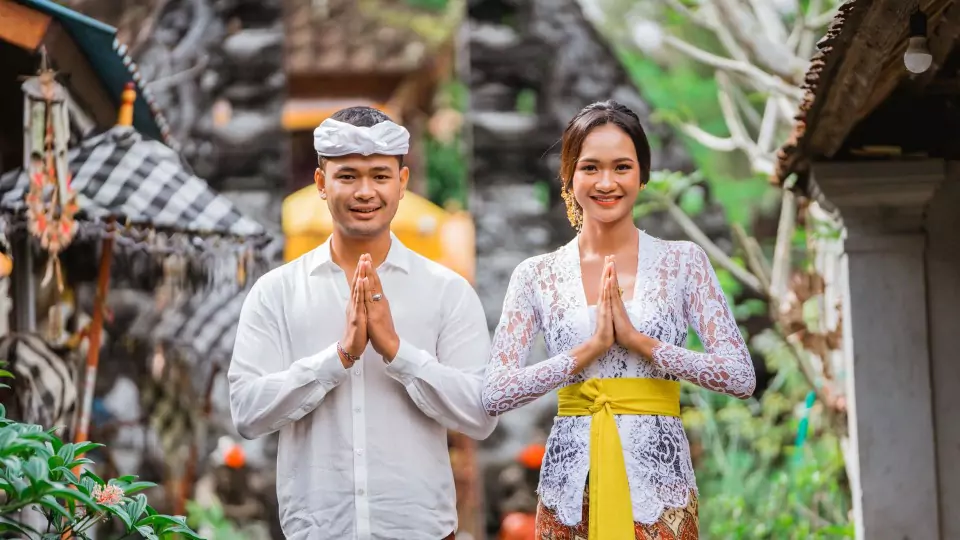Hey there, adventurers! Planning a trip to the beautiful island of Bali? Before you pack your bags, let’s discuss something super important – the essential phrases for visiting Bali! Knowing a few key phrases in Bahasa Indonesia can make your trip much better. It shows respect for the culture, helps you connect with the people, and can even get you out of tricky situations. Don’t worry; you don’t need to be fluent! Just a handful of must-know phrases can go a long way.
Let’s dive into the eight essential phrases every traveler should know before visiting Bali. By the end of this post, you’ll be ready to impress the locals and navigate your way through this tropical paradise like a pro!
For a comprehensive guide to exploring Uluwatu, check out out Uluwatu Travel Guide.

1. “Selamat Pagi/Siang/Sore/Malam” (Good Morning/Day/Afternoon/Evening)
First, let’s learn how to greet people in Bali. “Selamat” means “good,” and you can pair it with the time of day. “Pagi” is morning, “siang” is day, “sore” is afternoon, and “malam” is evening. So, if you’re heading out for a morning walk on the beach, say “Selamat pagi!” to the friendly faces you meet.
2. “Terima Kasih” (Thank You)
Gratitude is universal, and saying “thank you” in the local language is always appreciated. In Bahasa Indonesia, “terima kasih” is the magic phrase. Whether you’re thanking your waiter for a delicious meal or a kind stranger for giving you directions, a heartfelt “terima kasih” will bring a smile to their face.
3. “Permisi” (Excuse Me)
When you need to get someone’s attention or squeeze through a crowded space, use “permisi.” It’s a polite way to say “excuse me” and shows respect for the people around you. Remember, Balinese culture values politeness and courtesy, so a little “permisi” can make a big difference.
4. “Tolong” (Please)
Just like “thank you,” “please” is a magic word that opens doors and hearts. In Bahasa Indonesia, “tolong” is the way to say it. Whether you’re asking for help, placing an order, or making a request, adding “tolong” will make your words sound kinder and more respectful.

5. “Maaf” (Sorry)
Mistakes happen, and knowing how to apologize is important in any language. In Bahasa Indonesia, “maaf” is the word you need. Whether you’ve accidentally bumped into someone or made a cultural faux pas, a sincere “maaf” can help smooth things over and show that you meant no harm.
6. “Berapa Harganya?” (How Much Is It?)
When you’re out shopping or browsing the local markets, knowing how to ask for prices is key. “Berapa harganya?” means “how much is it?” in Bahasa Indonesia. Armed with this phrase, you can confidently navigate the colorful stalls and find the best deals on souvenirs and local crafts.
7. “Saya Tidak Mengerti” (I Don’t Understand)
Sometimes, despite your best efforts, you might find yourself in a situation where you don’t understand what’s being said. That’s okay! Just use the phrase “saya tidak mengerti,” which means “I don’t understand.” Most Balinese people will appreciate your honesty and try to find another way to communicate with you.
8. “Sama Sama” (You’re Welcome)
Last but not least, let’s learn how to respond when someone thanks you. In Bahasa Indonesia, “sama sama” is the equivalent of “you’re welcome.” It’s a friendly way to acknowledge someone’s gratitude and show that you were happy to help.
Frequently Asked Questions (FAQ)
Q1. Do I need to be fluent in Bahasa Indonesia to visit Bali?
No, you don’t need to be fluent! While knowing some essential phrases is helpful, many Balinese people, especially those in the tourism industry, speak English. Don’t be afraid to use gestures or resort to English if needed.
Q2. Can I use these essential Indonesian phrases in other parts of Indonesia?
Yes, Bahasa Indonesia is the official language of Indonesia, so these must-know phrases will be understood throughout the country. However, keep in mind that some regions may have their own local languages or dialects.
Q3. Is it okay to use “you” instead of the more formal “Anda” when speaking to locals?
In most casual settings, using “you” (kamu) is fine. However, if you’re speaking to someone older or in a more formal situation, it’s better to use “Anda” to show respect.
Q4. Will locals appreciate it if I try to speak Bahasa Indonesia?
Absolutely! Balinese people are known for their warmth and hospitality. They will be thrilled to see you making an effort to learn their language. Even if you make mistakes, they will appreciate your attempt and be more than happy to help you learn.
Conclusion
There you have it, folks – the eight essential phrases every traveler should know before visiting Bali. Remember, language is a powerful tool for connection and understanding. By making an effort to learn and use these important expressions, you’re showing respect for the local culture and opening yourself up to more meaningful interactions with the people you meet.
So, go ahead and practice your “selamat pagi” and “terima kasih.” Embrace the adventure, make new friends, and let the magic of Bali unfold before your eyes. Trust me; your trip will be all the richer for knowing these essential phrases.
Happy travels, and “sampai jumpa” (see you) in Bali!
For more travel tips and guides, visit our Uluwatu Guide


